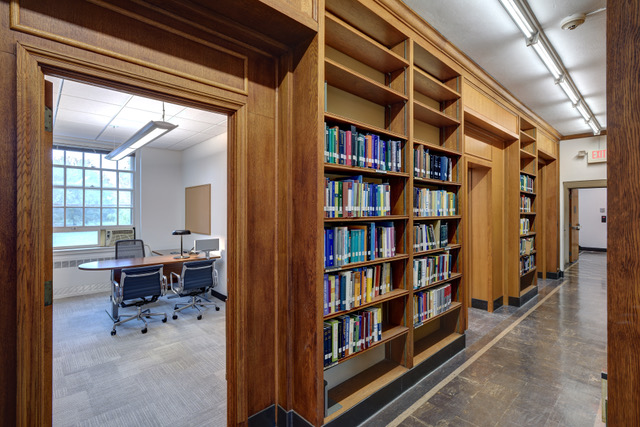After nearly a century without major renovations, the building housing offices and library stacks for the Institute for Advanced Study — the independent post-doctoral research center in Princeton where Albert Einstein famously spent his late career — has undergone a partial interior redesign led by integrated design firm JZA+D.
“Fuld Hall hasn’t been touched in a long time,” Mark A. Sullivan, architect and partner with the locally headquartered, globally active JZA+D, said in a prepared statement. “Given the evolution of scientific pursuit, the spaces within buildings like this one need retrofits to suit changing needs and to support the expansion of digital resources.”
Sullivan and managing partner Joshua Zinder realigned and updated 2,000 square feet of the interior, but with a mission of providing a template for the complete interior renovation to come later, according to the statement.
“Because most resources have been transferred to digital media and archived electronically, periodical rooms and library stacks are no longer the best use of space. New member offices are needed far more,” Sullivan said in the statement. At the institute, members are invited to work and study for a set term, as opposed to faculty who enjoy permanent positions and even retain their office spaces after retirement.
The project team tore out the entire periodical room and punched new door openings from the hall to create space for three new member offices. Additionally, the design has replaced a mid-20th Century library stack with four more member offices, and one new faculty office. Old architectural drawings indicate this latter area may have included Einstein’s own faculty office, before it was converted to stacks in 1984, according to the statement.
JZA+D’s scope for the project also included renovating the librarian and assistant librarian offices, as well as the 160-square-foot “secure stack,” which Sullivan said houses the institute’s most important and fragile volumes, according to the statement. As an ode to the building’s history, original millwork and shelving salvaged from the periodical room has been reinstalled in the secure stack area of the librarians’ offices.
The palette of durable finishes and furnishings for the updated interiors includes carpet tile for most floors, new LED lamps and fixtures, and updated drop ceiling systems to replace old sheet rock.
“Some of the ceilings were actually an original plaster mix containing asbestos, creating additional challenges for the construction teams,” Sullivan said in the statement.
The design team bore in mind that this project would be a trial run for a future full renovation of Fuld Hall, so the palette can be easily replicated in the future.
“We couldn’t be more pleased with the overall outcome of this project,” Janine M. Purcaro, chief operating officer at the Institute for Advanced Study, said in the statement. “Mark and the whole team at JZA+D are ideal collaborators, listening to our needs and working closely with us to deliver a promising template for the eventual full renovation of Fuld Hall.”
The project could possibly include, in the future, updates to aging mechanical systems and replacement of the original, single-pane sash windows.
Located in Princeton, JZA+D was founded in 2006 by principal Joshua Zinder, AIA, to deliver multidisciplinary services for sustainable and contemporary buildings, interiors and product designs. The collective educational and professional experience of JZA+D’s staff spans more than 95 years in global markets. JZA+D has won numerous design awards and its work has been seen in publications around the world. The staff actively participates in trade and professional organizations such as AIA, NCARB, USGBC, ACSA, IIDA, IOREBA, NJRA and Gotham Networking. More than half of the firm’s architectural staff is LEED accredited. For more information, visit www.joshuazinder.com.
The Institute for Advanced Study is one of the world’s foremost centers for theoretical research and intellectual inquiry. Located in Princeton, the IAS is dedicated to independent study across the sciences and humanities. Founded in 1930, the Institute boasts the work of founding IAS Professor Albert Einstein. Each year, the Institute welcomes more than 200 of the world’s most promising post-doctoral researchers and scholars who are selected and mentored by a permanent faculty, each of whom are preeminent leaders in their fields. Among present and past faculty and members there have been 35 Nobel Laureates, 42 of the 60 Fields Medalists, and 19 of the 22 Abel Prize Laureates, as well as many MacArthur Fellows and Wolf Prize winners.

